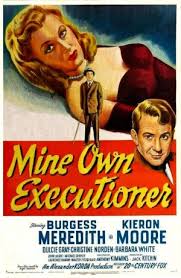
MINE OWN EXECUTIONER
UK, 1947, 108 minutes, Black and white.
Burgess Meredith, Kieron Moore, Dulcie Gray, Barbara White, Christine Norden.
Directed by Anthony Kimmins.
Mine Own Executioner comes from a quotation from the poet John Donne, focusing on the way we torment ourselves. It is the title of the novel by Nigel Balchin, who adapted the novel for his screenplay.
The film was one of the earliest about psychiatry. A solid British production and British cast, it has American Burgess Meredith in the lead. He portrays a psychiatrist, shown at work, yet with his own complexities and problems, working on hunches and unable to save one of his clients from killing his wife and suicide. Kieron Moore is effective as the troubled ex-soldier.
The film has a London setting of the period, raises questions about counselling, psychiatry and therapy. It has a good climax - both with the suicide on a ledge and the psychiatrist climbing a ladder to reach him, as well as an airing of the issues in court.
1.Effective psychological drama? Britain of the '40s?
2.The English settings, London, the '40s? The world of psychiatry, medicine? Social life? The musical score?
3.The quote from John Donne, personal torment, self-torment?
4.Burgess Meredith as Felix: his practice, with the other doctors, the need for funds? The boy and the bed-wetting? His rich clients and their problem? Mrs Lucian and her visit, concern about Adam? Adam coming to see him, the first interview, taking his case, the checking out with Dr Garsten? His relationship with Pat, the stresses at home? Socialising with Peter and Barbara, Barbara's visit and her emotional relationship with him? His sense of call?
5.Felix and his relationship with Pat, his angers, her awkwardness, the buying of the coat? Puzzling about his life with Dr Garsten? The reconciliation with Pat? Barbara, social encounters, the professional encounter? The buying of the coat? Going out with her - and Pat's desperate phone call? His relationship with his friends and doctors? Pressure for grants, supervision? His work with Adam, his style, ability to listen, to assess? Adam taking his cane and the case? Listening to the stories about his wife? About the service in Burma, the crash, being carried through the jungle? Imprisoned, tortured? A re-examination of his past? The need to go deeper, Adam's wariness? Felix's illness, letting Adam go? Dancing with Barbara, the message, going immediately home, Adam there with Pat, getting her away? The suicide attempt, climbing the ladder, pleading, reassuring Adam about his wife having no pain? Adam's killing himself? His presence in the court, his directness and telling the truth? Vindication? Wanting to give up? The boy arriving again - and his realisation of his talent and vocation? The portrait of a psychiatrist, ordinary, with his own problems, able to be sympathetic, not dogmatic?
6.Mrs Lucian and her concern, her husband's threats, the consultation, advising her not to stay in the shadow, her being seen as the Japanese sentry, her husband killing her? Adam and his manner, his caution, stealing, wanting to talk about it, the limp? Wanting to remember, not being able to? Talking about himself in the third person? The war experience, the crash, through the jungle, the imprisonment, the torture, not telling what the Japanese wanted, pouring it out, even making it up? Sense of shame? Feeling better, the gun? Killing his wife, going to Pat? His standing on the ledge, the suicide?
7.Pat, her relationship with her husband, support, feeling dull, wary, reconciliation? Jealousy of Barbara, the coat? Threatened by Adam? Final affirmation of her husband?
8.Peter and Barbara, social friends, Peter's interest in psychiatry, Barbara's consultation, flirting, with the coat, her deliberate indiscretions? The evening with Felix?
9.Dr Garsten, medical science, discussing psychiatry, warm help, support of Felix personally? His testimony in the court - and his shrewdness in getting the measure of the magistrate doctor?
10.The magistrate, the question of medicine and psychiatry, the interviews and cross-examinations, Dr Garsten's testimony?
12.The themes of psychiatry, theories and practice? In the '40s? Now?